Senior registered nurse (RN) Hannah Madrid has never been to Perth, but she’s moving there with her whānau in two weeks’ time.
Madrid, 39, is hoping for more time with her two young children, and “of course, better pay” in a role at a private hospital.
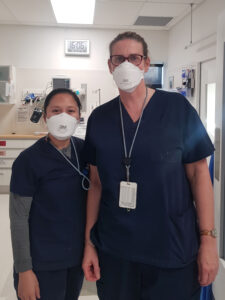
This year, she took on a second job, in addition to her four-day role at an urgent care practice. She works one night shift a week at a rest home, earning $45 per hour, “to help pay the bills”. The RN has also “cashed out” some annual leave – which she accrued during COVID, to alleviate financial pressures.
‘The fight’s over for a lot of us, it’s been two years.’
In her role at the urgent care practice, Madrid is paid a base rate of $38.25 as a senior nurse, who also takes on shift lead duties.
“Sometimes it gets to you. I just woke up and said ‘this is not happening’ . . . “
Other practice nurses Kaitiaki spoke to are staying put in New Zealand, but expressed deep concerns about the pay disparity with Te Whatu Ora nurses, and the impact of short-staffing on patients.
Cost of living spikes after MECA expires
In the 21 months since the Primary Health Care (PHC) Multi-Employer Collective Agreement (MECA) expired, a third of practice nurses have not received an increase in pay, a Tōpūtanga Tapuhi Kaitiaki o Aotearoa NZNO survey found.
In that time, the cost of living has skyrocketed, with inflation rates moving from 1.5 per cent in March 2021 (when the MECA commenced) to 4.9 per cent by the time it expired in August the same year.
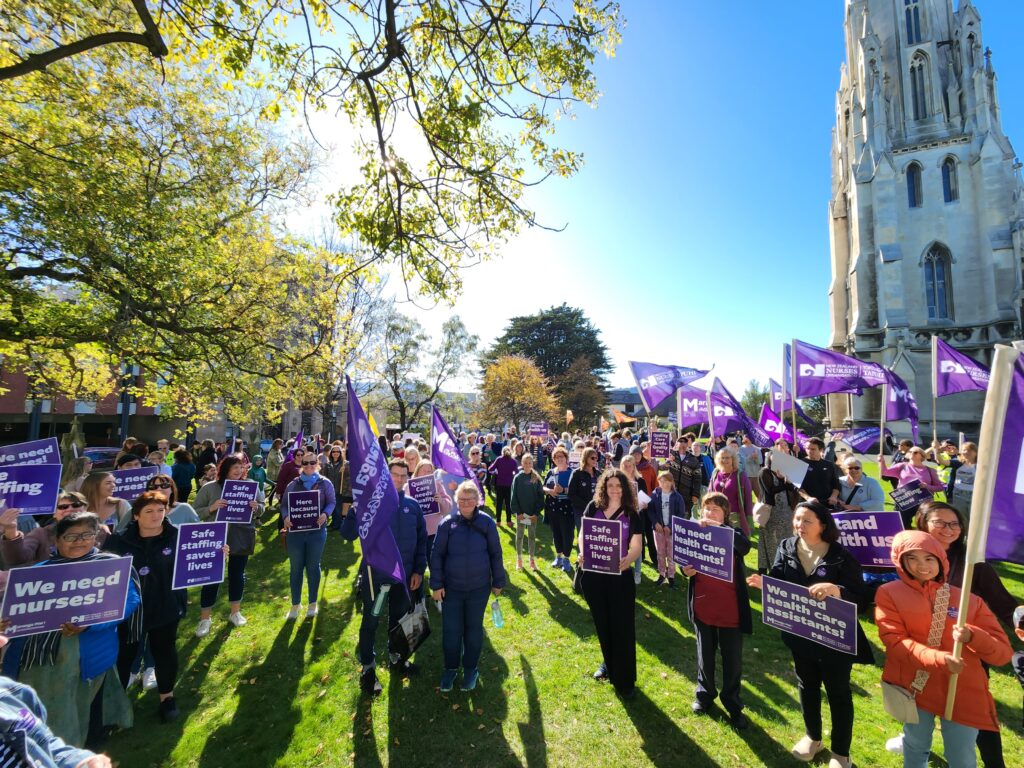
In June 2022, the annual inflation rate was the highest in three decades at 7.3 per cent. It has remained high, at 7.2 per cent since then.
Across the country, wages have gone up. In the year to March 2023 average salary and wage rates (including overtime) increased 4.3 percent, Statistics NZ said.
Other PHC sectors have received pay parity funding, or will get it from July 1. But those in primary care continue to wait.
‘We are swamped, absolutely swamped from the minute we get in to the minute we go home.’
A decision on whether to include practice nurses in government funding for PHC nurses and health care workers hinges on wage data being collected by Te Whatu Ora.
Te Whatu Ora community health system improvement and innovation, commissioning Mark Powell said a survey of GP owners was extended to May 3 due to a low response, with 50 per cent of GPs providing the data.
Information provided by NZNO will be used “to inform advice to ministers about whether practice nurses should be included into the pay disparities initiative”, he said.
The response was welcomed by NZNO PHC Meca bargaining team, industrial adviser Danielle Davies.
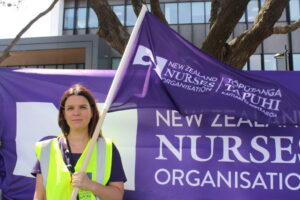
“We are pleased by the openness of the current Health Minister, Ayesha Verrall, in her consideration of including the PHC sector in additional funding effective 1 July 2023.”
Despite the ongoing wait for a decision, the NZNO bargaining team will meet with employer advocates to resume negotiations next week.
Davies said they would be advocating on members’ claims, including nurse prescriber pathways and long service leave entitlements.
Potential pay uplift too late
For Madrid’s co-worker, Nicola Ferguson, the ongoing battle for pay parity and then being excluded from government funding has pushed her to look for work with Te Whatu Ora – a first in her 10 years with the practice.
“The fight’s over for a lot of us, it’s been two years.”
As a shift leader, she said the stress and responsibility of trying to ensure sufficient nursing care when every shift was short-staffed by one to two nurses, was exhausting.
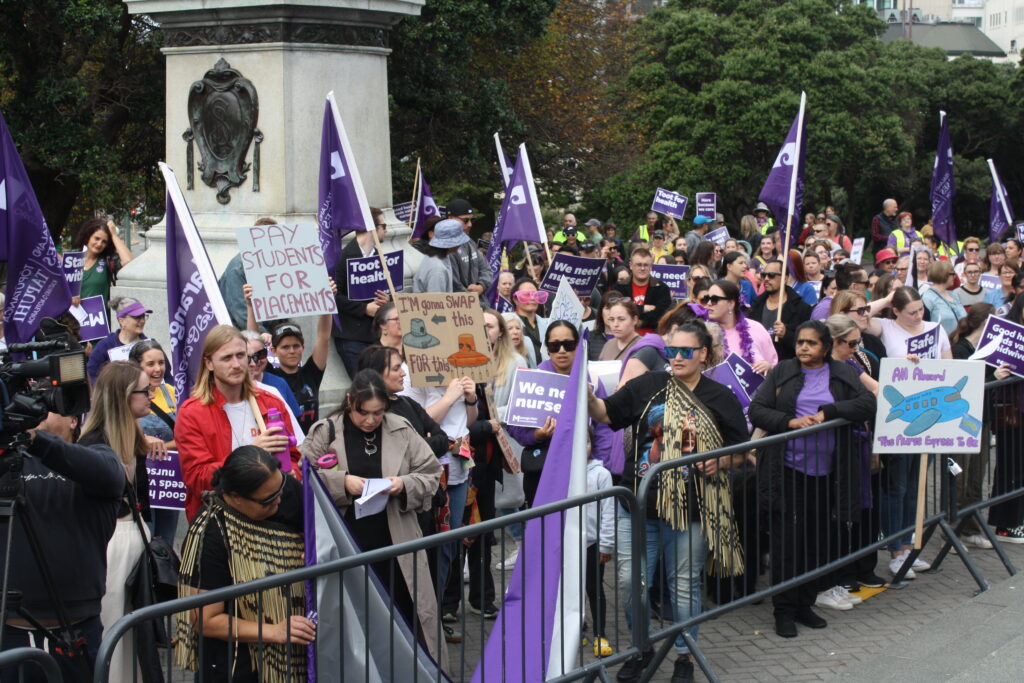
Ferguson felt GP owners could do more to bridge the pay gap with Te Whatu Ora nurses, without government funding.
“They are businesses and they are making money. They wouldn’t be in it if they weren’t. And I think they have to take part of the responsibility.”
Rest home pay lift puts thoughts of Aussie on backburner
Kapiti coast RN Freya Border, 55, has been toying with the idea of moving to Australia, but notice of an increase in her pay as a casual at a local rest home has put an end to that – for now.
Border works for two employers – a general practice and urgent care clinic, and a rest home.

This week the experienced RN was told her pay rate at the 24-bed rest home was increasing from $38.22 to $44.77 due to government funding.
The increased rates were still less than those she could earn at Te Whatu Ora, but would be a significant improvement, Border said.
She said it was hard to believe the Government would not include practice nurses in the pay parity funding.
“It’s obvious. There’s going to be no immunisations. Primary health keeps people out of hospitals – I can’t even comprehend why they’re not giving [us] a boost yet.”
‘Hugely’ reliant on government funding
Jessica Mead is a nurse prescriber at a practice on Waiheke Island and says her employer, Piritahi Hau Ora Trust, established by Piritahi Marae, relies “hugely” on government funding.
“We have some of the cheapest GP fees around the country, and we have a lot of patients who can’t pay and with the visitors – some of them just take off and don’t pay.
‘A lot of us are trying to be nurse practitioners or get into nurse prescribing because the load on the doctors is huge.’
“There’s this concept that every general practice is owned by these rich GPs who are just not paying their nurses properly but it’s actually often not the case.”
Mead said for those practices the only option would be to put their fees up.
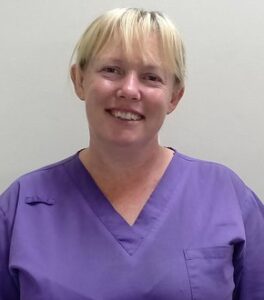
The practice, which also provides urgent care, was under greater pressure as two other trust-owned clinics on the island had “closed their doors” due to staffing issues.
As a popular tourist area, the practice served a large casual patient load, in addition to enrolled patients.
Mead negotiated an hourly base rate of $42.30 with the trust, as nurse prescribers were not covered by the MECA. But this rate was $8 to $10 less than the pay for an equivalent role at Te Whatu Ora, she said.
Along with other nurses at the practice, Mead is continuing her studies to further extend her nursing scope, but already sees about 20 patients a day on her own.
“A lot of us are trying to be nurse practitioners or get into nurse prescribing because the load on the doctors is huge.”
Leaving the job wasn’t an option for her, as her home, young child and the child’s father (Mead’s ex-husband) were on the island.
“You can’t do your job well.”
Like Mead, RN Anna Mulloy is training to become a nurse prescriber, to help take on more patients at the South Auckland practice where she works.
“We are swamped, absolutely swamped from the minute we get in to the minute we go home.”
Last winter Mulloy “stepped up” to do assessments for all child patients, in addition to all her other work – so that the GP could focus on complex adult patients, she said.
Mulloy is on Step 5 of the MECA and is paid $35 per hour, and says the pay gap with her hospital colleagues is “very frustrating”, but she tries to focus on the job satisfaction the role gives.
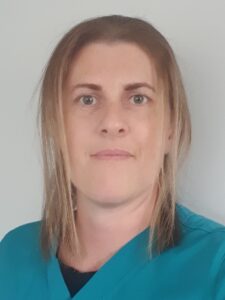
She has no interest in moving to Australia, or working in a hospital as her part-time practice role fits in with parenting young children.
Mulloy said she is extremely concerned about the impact of staff shortages on patients.
“You can’t do your job well.”
Pressure to improve immunisation rates and complete flu and COVID vaccinations were impossible to achieve, Mulloy said.
” . . . your day is absolutely slammed with just the patients walking through the door and on the other end of the phone.
“So, we’d like to do our jobs properly and recall all these people but there’s no time, you just can’t get it done.”



